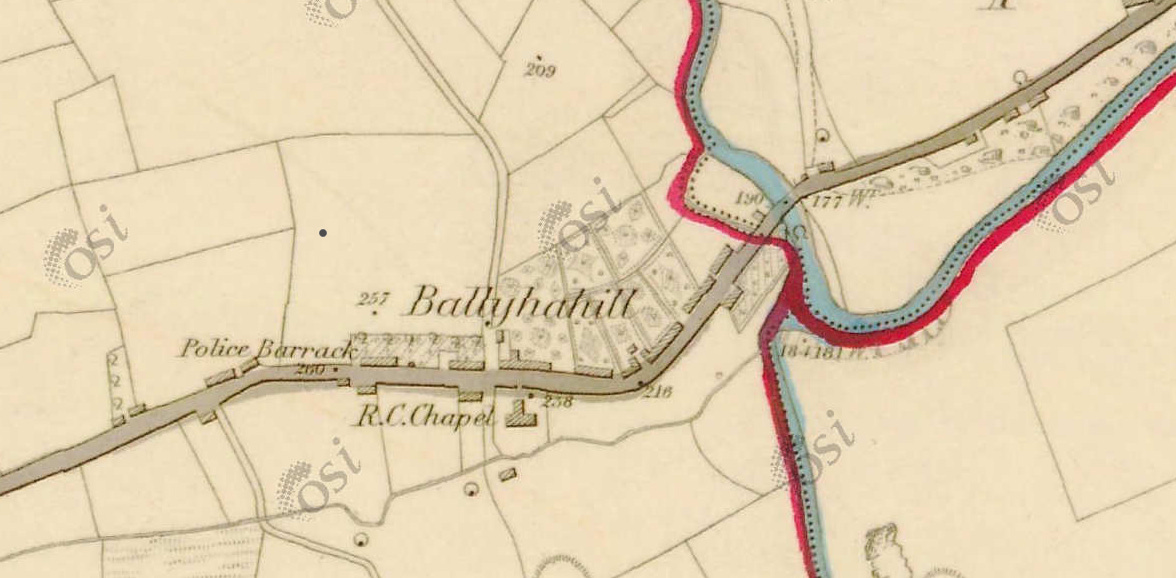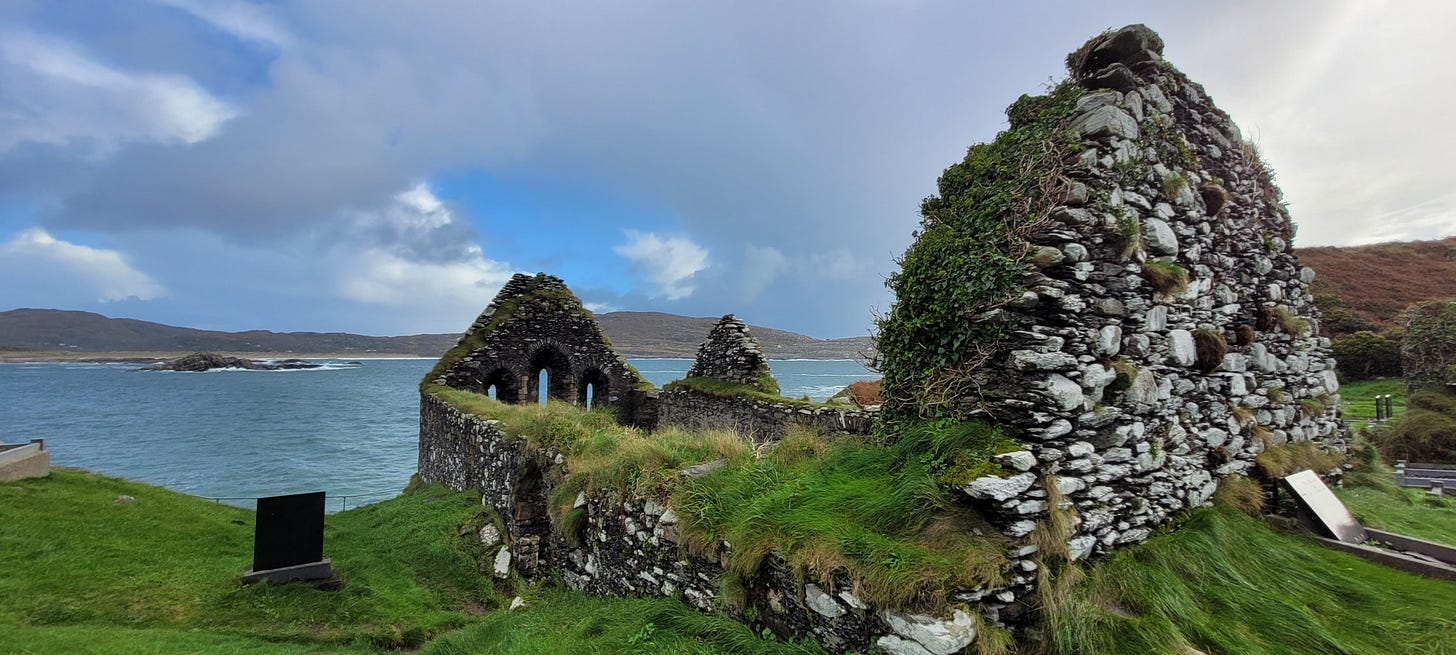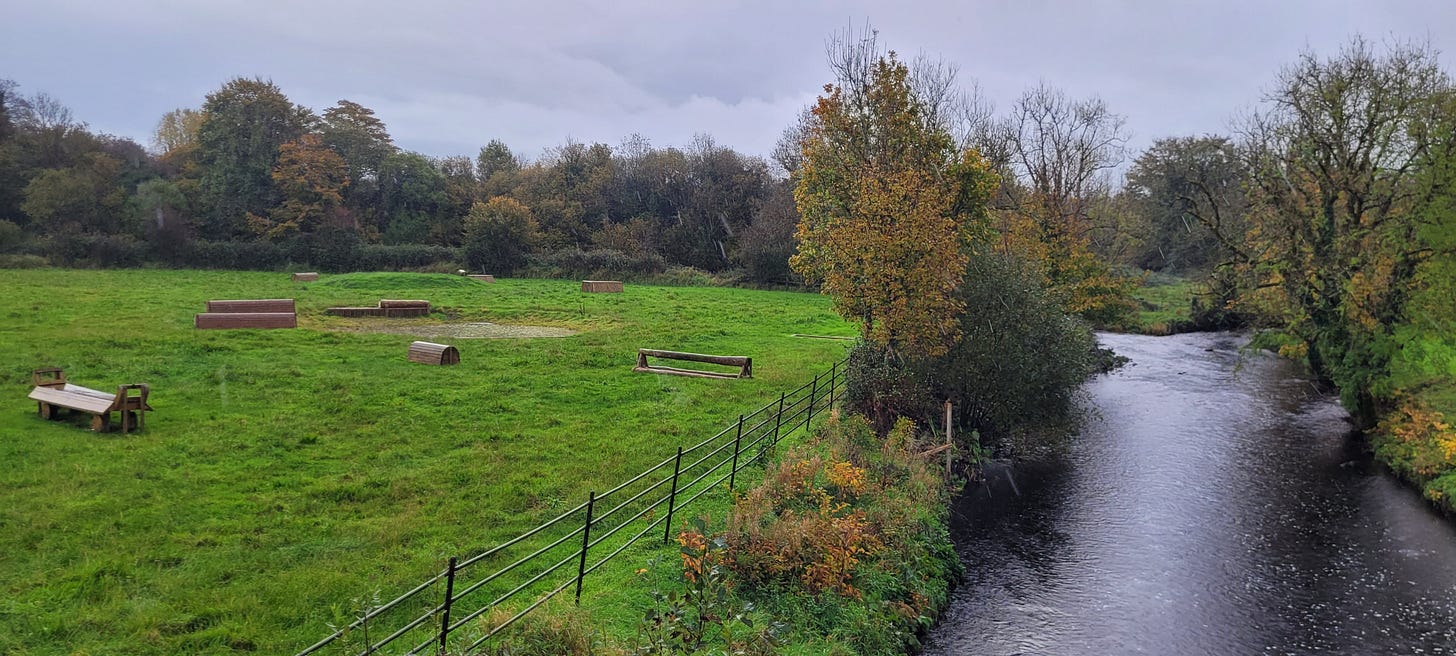S01E08: "Common, decent folk" -- On returning to Ballyhahill
Whisky, holy water and trifle (again).
In the latest instalment in My Own Private Family History Jaunt (unofficial series title, needs some work), I return to Baile Dhá Thuile, the scene of a crime committed by a potential ancestor. If you’ve joined recently and need a recap, I’ve now created a separate section on my Substack home page where you can access all previous instalments!
BACK IN BALLYHAHILL • I'll spare you the saga of my drive from Westport, County Kerry, to Ballyhahill, County Limerick, except to note that instead of driving there directly I opted to take the long way, via Dingle, where I barely had time to eat a massive lunch of fish and chips before hitting the road again. But I did catch a glimpse of some epic Atlantic-facing beaches down on the Dingle peninsula and look forward to going back there someday.
I arrived back in Ballyahill late in the afternoon and left my car once more in the church carpark. At least it wasn’t raining. After just a few minutes, another car rolled down the hill and stopped. P—, the publican, waved me over.
“Get in,” he said, “I’ll drive you.”
“All right,” I replied, frowning slightly.
Having passed it on my way into town, I knew the pub was literally one-hundred metres up Main Street. It’s not listed on Google Maps, but if you use street view you’ll see it: a modest, yellow building with a Heineken sign out front and, in authentic Gaelic lettering, the name Barr na sraide.
Which, funnily enough, means ‘Top of the Street’.
Wondering what the Jamesons was going on, I got into the car. I had a sudden flashback to the first time I ever got into a car with a stranger.
I was around six years old and living with my family in Ballina. I’d just got off the school bus but fell down on the side of the road, grazing my knee. Someone, a stranger, drove by in their car and then stopped, asking me if I wanted a lift home. Like the pub in Ballyhahill, our house was only around 100 metres away.
Little did I know but my mother was waiting on the front steps, looking on horrified as I got into the car and drove slowly up the street towards her. Then it stopped, and I got out.
“Hi mum,” I probably said as I stepped onto the front verandah.
“Get inside!” she no doubt yelled, before offering me a recap on the stranger-danger lesson.
I still remember the tiles on that tiny front porch, the size and shape of the house, the dimensions of the extension we built on the back and the little fern garden around the side. But I have no recollection whatsoever of the make of that car, let alone the identify of the driver, or what we might have spoken about on that miniature trip down the street.
Back in Ballyhahill, P— started the engine.
“Now, there’s some kind of issue with the brakes,” he confided, as he drove in slow motion up the hill, parking right out the front of the pub.
“Ah,” I replied, with my hand on the door handle, ready to exit at a moment’s notice.
But I need not have feared. Whatever the brake issue was, it certainly did not prevent that car from remaining in place as we both got out. One hour later, when P— very kindly offered to drive me back down the hill, the car was still there.
WHISKEY AND HOLY WATER • Barr na sraide was actually closed but the door to the pub was unlocked. P— shepherded me in, and I realised that the building was both a pub and, presumably, P—’s house. Inside the front door, I saw a holy water font, which made me laugh: as far as I could tell, the font was empty, but it reminded me of the khaki-green sponges I used to see in similar fonts in country churches in Australia, still wondrously damp despite the drought.
The pub itself was like any other country pub, I guess: but unlike the many ‘authentic’ Irish pubs that have sprung up the world over, with their mass-produced Guinness posters, collections of hurling sticks and worn-in tables and benches, this one felt truly lived in. Partly because it appeared to be P—’s abode but also due to the lack of show. And partly because it wasn’t actually open yet.
No sound system piped diddly music into the room. There was no snug, and no circle of musicians playing traditional numbers. No mysterious Strider-like characters proppped up the bar or stared at newcomers with barely concealed hatred. And no comforting sounds of barrels clanging against one another emanated from the cellar, accessible via a wooden trapdoor at street level.
Instead, P— gestured towards a low table and I sat down at a minature stool, waiting for a second man to join us. He turned out to be the man whom P— had tried to contact the first time I met him, in the kitchen behind the supermarket. J— was a tall, slightly tired looking bloke about my age who refused P—’s offer of a glass of whiskey and sat himself at the table next to me.
“You’re not having one?” P— demanded.
“No, thank you,” J— replied, a second time.
“Me either,” I added. “I’m driving.”
“Gah, what does it matter,” P— not so much asked as stated, plonking a shot glass in front of me and filling it to the brim with whisky from a bottle with no label.
“Cheers, then?” I hoped.
“Right,” P— replied, looking pleased, before pouring one for himself.

“COMMON, DECENT FOLK” • J— turned out to be the town’s rsident historian. He had with him a sheaf of papers and a copy of Poverty to Promise: The Monteagle Emigrants, 1838-1858, which documents the creation of the West Limerick disapora in Australia. He had also handwritten the names of the 11 local men—including John Hurley—who were found guilty of assaulting the rent collector and transported to New South Wales in 1834.
In addition, it turned out J— knew C—, the genealogist in Croom who had helped me find out more about Elizabeth Fitzgerald and the Hurley family in Ballyhahill. He seemed pleased that I had visited her, and we spoke at some length about William and Johanna Hurley, although J— himself had no knowledge of their personal stories.
Finally, J— pulled out a bound set of computer printouts of unknown provenance which seemed to be a list of assisted emigrants from West Limerick. However, William and Johanna’s names were not among them, suggesting that they may have paid for their own passage, although how they would have done so I am not sure.
It also remains unclear how William and Johanna got from Ballyhahill to Southampton, where they boarded the Fitzjames for Adelaide. This is partly due to the fact that, at that time, Ireland was considered a part of Great Britain, meaning that a journey from, say, Cobh (then known as Queenstown) to England would have been considered a ‘domestic’ trip, and therefore ess likely to be documented.
In contrast, I was later able to retrace one version of Wiliam and Johanna’s journey from Adelaide, South Australia, to Williamstown, Victoria, due to the fact that it was considered an ‘international’ trip—that is, between two British colonies. This despite my mother’s belief that they travelled overland, which begs the question as to whether that was even possible in 1858.
We discussed these types of logistics for a while, and then returned to more local matters, including a possible former location of the Hurley farm, now lost to memory. Perhaps it was the whisky working its way through me, but I got a strong sense of anticlimax from our meeting. We had clearly come up against that infamous Hurley wall, although J— gave me a copy of a letter from another member of the Hurley family in Ireland, which I still haven’t followed up on.
But just as the conversation was winding down, J—, perhaps sensing my disconsolate mood, said something that has stayed with me ever since.
“The thing you need to remember is that John Hurley was not a criminal or lowlife in any sense of the word. Both the Hurleys and the Fitzgeralds were common, decent folk.”
It seemed very important to J— that I understand this basic truth. Did this need to impress on me the ordinariness of my ancestors spring from a sense of shame about John Hurley’s involvement in insurrection? The taboo of convict origins? He even went so far as to repeat the phrase.
Common, decent folk.
There is a lot more I could write about the history of political protest in this neck of the West Limerick woods—which The Old Limerick Journal, with refreshing directness, once described as “a remarkably violent society”—including the activities of the Whiteboy and Rockite movements, and the oppressive nature of the British constabulary, not to mention the Traveller presence in nearby towns including Rathkeale.
John Hurley’s story alone would make a great book, although I haven’t found evidence of anything like it so far in my own research.
So much to write, so many possible strands of inquiry.
So many narrow laneways left to drive—or walk—along.
In the end, while our meeting in Barr na sraide was inconclusive, I took both men’s telephone numbers, and promised to return some day to Ballyhahill. As we were getting ready to leave, P—’s little mobile rang and he moved into the other room, which may have been his living room, to take the call.
A moment later we heard him shouting at his interlocutor.
“None of your business!” he cried, several times.
J— pretended not to notice but P— was clearly talking about me, or at least the fact that he was meeting with someone searching for their Ballyhahill roots.
“None of your bloody business!” he yelled again, then returned to the bar, mild as you like.
“Right, I’ll drop you both down the hill,” he said.
J— tried to refuse but there was no use going against the wishes of this inscrutable man, who clearly had a temper. So we got back in that battered car for the one-hundred metre journey to the church carpark.
AN ABSOLUTELY ORDINARY SHERRY TRIFLE III • Having dropped us off, P— turned around a drove back up the hill. J—, for his part, went home. I had a long drive still ahead of me, and it was getting dark. Even worse, the rain was closing in and it looked like it would be hosing down for the whole evening. But I wasn’t quite ready to leave Ballyhahill behind just yet.
I crossed the road and entered P. O’Ruairc Grósaeri for the second time. Neither the woman who had been working the till nor the man attending to the ham were present in the shop. In fact, it seemed the personnel had changed entirely. Had they ever been there in the first place? And if not where the heck was I?
I searched the shelves frantically for another sherry trifle but found only a different brand, which I bought anyway.
The woman at the till rang up my purchase and smiled in a dim way when I thanked her and wished her a good day.
I ran through the rain to my car, and drove back the way I’d come two days earlier, wishing I’d bought some kind of souvenir, or postcard. But the supermarket didn’t stock anything like that, and maybe the trifle was more than enough.
Common, decent enough.
Thank you for accompanying me on my extended journey into genealogy! Please feel free to leave a comment (if you’re reading on Substack), reply directly to this message (if you’re receiving the newsletter via email) or else contact me the old-fashioned way at davey@daveydreamnation.com.
All the best and bye for now,
Davey



